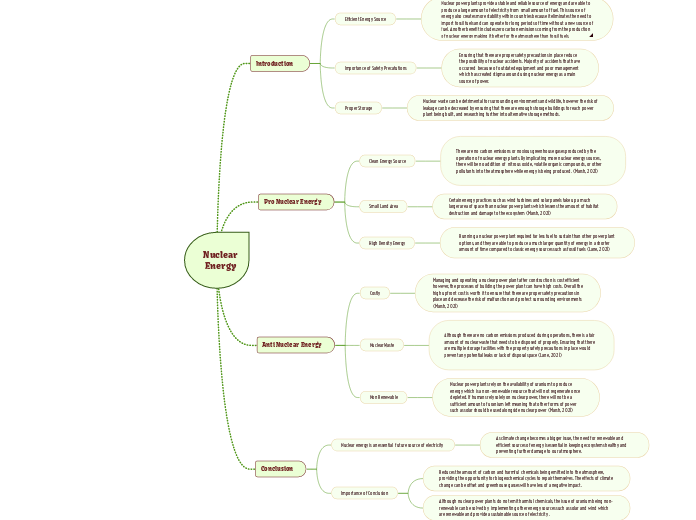Nuclear Energy
Introduction
Efficient Energy Source
Importance of Safety Precatutions
Ensuring that there are proper safety precautions in place reduce the possibility of nuclear accidents. Majority of accidents that have occurred because of outdated equipment and poor management which has created stigma around using nuclear energy as a main source of power.
Proper Storage
Nuclear waste can be detrimental for surrounding environments and wildlife, however the risk of leakage can be decreased by ensuring that there are enough storage buildings for each power plant being built, and researching further into alternative storage methods.
Pro Nuclear Energy
Clean Energy Source
Small Land Area
Certain energy practices such as wind turbines and solar panels take up a much larger area of space than nuclear power plants which lessens the amount of habitat destruction and damage to the ecosystem (Marsh, 2021)
High Density Energy
Anti Nuclear Energy
Costly
Managing and operating a nuclear power plant after construction is cost efficient however, the processes of building the power plant can have high costs. Overall the high upfront cost is worth it to ensure that there are proper safety precautions in place and decrease the risk of malfunction and protect surrounding environments (Marsh, 2021)
Nuclear Waste
Non Renewable
Nuclear power plants rely on the availability of uranium to produce energy which is a non-renewable resource that will not regenerate once depleted. If humans rely solely on nuclear power, there will not be a sufficient amount of uranium left meaning that other forms of power such as solar should be used alongside nuclear power (Marsh, 2021)
Conclusion
Nuclear energy is an essential future source of electricity
As climate change becomes a bigger issue, the need for renewable and efficient sources of energy is essential in keeping ecosystems healthy and preventing further damage to our atmosphere.
Importance of Conclusion
Reduces the amount of carbon and harmful chemicals being emitted into the atmosphere, providing the opportunity for biogeochemical cycles to repair themselves. The effects of climate change can be offset and greenhouse gasses will have less of a negative impact.
Although nuclear power plants do not emit harmful chemicals, the issue of uranium being non-renewable can be solved by implementing other energy sources such as solar and wind which are renewable and provide a sustainable source of electricity .
